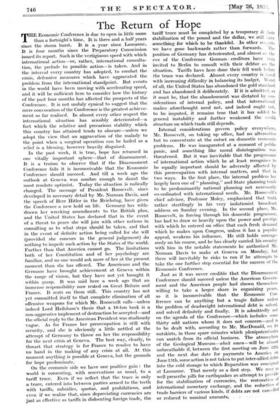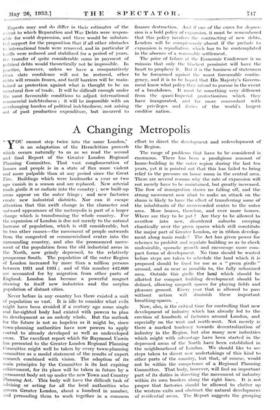The Return of Hope
THE Economic Conference is due to open in little more than a fortnight's time. It is three and a half years since the storm burst. It is a year since Lausanne. It is four months since the. Preparatory Commission issued its report. Such is the vertiginous speed with which international action—or, rather, international consulta- tion, the prelude to possible action—is taken. And in the interval every country has adopted, to combat the crisis, defensive measures which have aggravated the problem from the international standpoint. But events in the world have been moving with accelerating speed, and it will be sufficient here to consider how the history of the past four months has affected the prospects of the Conference. It is not unduly cynical to suggest that the mere convocation of the Conference is the greatest achieve- ment so far realized. In almost every other respect the international situation has sensibly deteriorated—a fact which the relative and precarious stability_ which this country has attained tends to obscure—unless we adopt the view that an aggravation of the malady to the point when a surgical operation can be hailed as a relief is a blessing, however heavily disguised.
In the past week, it is true, hope has returned in one vitally important sphere—that of disarmament. It is a truism to observe that if the Disarmament Conference fails it is inconceivable that the Economic Conference should succeed. And till a week ago the outlook at Geneva was sombre enough to daunt the most resolute optimist. Today the situation is radically changed. The message of President Roosevelt, since developed in necessary detail by Mr. Norman Davis, and the speech of Herr Hitler in the Reichstag, have given the Conference a new hold on life. Germany has with- drawn her wrecking amendments to the British plan, and the United States has declared that in the event of a threat to peace she will join with other nations in consulting as to what steps should be taken, and that in the event of definite action being called for she will (provided she concurs in the general judgement) do nothing to impede such action by the States of the world. Further than that America cannot go. The limitations both of her Constitution and of her psychology are familiar, and no one would ask more of her at the present moment than she has offered. The Americans and the Germans have brought achievement at Geneva within the range of vision, but they have not yet brought it within grasp. It was said here a week ago that an immense responsibility now rested on Great Britain and France. It rests on them still. This country has not yet committed itself to that complete elimination of all offensive weapons for which Mr. Roosevelt calls—unless indeed Lord Hailsham's thesis that a I6-ton tank is a non-aggressive implement of destruction be accepted—and the official reply to the American President was studiously vague. As for France her preoccupation is still with security, and she is obviously a little nettled at the attempt of Germany to throw on her the responsibility for the next crisis at Geneva. The best way, clearly, to thwart that strategy is for France to resolve to have no hand in the making of any crisis at all. At this moment anything is possible at Geneva, but the grounds for hope predominate.
On the economic side we have one positive gain : the world is consenting, with reservations as usual, to a tariff truce. Even if we reflect that the truce is only a truce, entered into between parties armed to the teeth with tariffs, subsidies, quotas, and prohibitions, and even if we realize that, since depreciating currencies are just as effective as tariffs in dislocating foreign trade, the tariff truce must be completed by a temporary de facto stabilization of the pound and the dollar, we still !tare something for which to be thankful. In other respects we have gone backwards rather than forwards. The position of Germany has deteriorated, and almost on the eve of the Conference German creditors have been invited to Berlin to consult with their debtor on the situation. Tariffs have here done their fell work before the truce was declared. Almost every country is Need with increasing difficulty in balancing. its budget. Worst of all, the United States has abandoned the gold standard and has abandoned it deliberately. If it is admitted, as it must be, that the abandonment was dictated by con- siderations of internal policy, and that international malice .aforethought need not, and indeed ought not, to be imputed, it remains true that it has added to general instability and further weakened the credit structure on which trade still depends.
Internal considerations govern policy everywhere. Mr. Roosevelt, on taking up office, had no alternative but to concentrate at the outset on domestic economic problems. He was inaugurated at a moment of public panic, and something like moral disintegration was threatened. But it was inevitable that the programme of international action which he at least recognizes to be equally important should be adversely affected by this preoccupation with internal matters, and that in two ways. In the first place, the internal problem has largely been one of " planning," and State planning tends to be predominantly national planning not necessarily co-ordinated with international needs. Mr. Roosevelt's chief advisor, Professor Moley,' emphasized that truth rather startlingly in his very isolationist broadcast address on Sunday evening. In the second place, Mr. Roosevelt, in forcing through his domestic programme, has had to draw so heavily upon the power and prestige with which he entered on office that each fresh demand which he makes upon Congress, unless it has a popular appeal, weakens his influence. He still holds courage- ously on his course, and he has clearly carried his country with him in the notable statements he authorized Mr. Norman Davis to make at Geneva on Monday, but there will inevitably be risks to 'run if he attempts to take the one further step essential for the success of the Economic Conference.
Just as it was never credible that the Disarmament Conference should succeed unless the American Govern- ment and the American people had shown themselves willing to take a larger share in organizing peace, so it is inconceivable that the Economic Con- ference can be anything but a tragic failure unless the problem of deadweight international debt is solved, and solved definitely and finally. It is admittedly not on the agenda of the Conference—which includes some thirty odd, nations whom it does not concern—and is to be dealt with, according to Mr. MacDonald, on its outskirts, in those spare minutes which plenipotentiaries can snatch from its official business. The atmosphere of the Geological Museum—absit omen—will be almost unbreathable if, between the first meeting on June 12th and the next due date for payments to America on June 15th, some action is not taken to put inter-allied debts into the cold storage to which Reparation was consigned at Lausanne. That merely as a first step.. We may as well prescribe pills for earthquakes as attempt to provide for the stabilization of currencies, the restoration of international monetary exchange, and the reduction of trade barriers of various kinds, if debts are not cancelled or reduced to nominal amounts. - - Experts may and do differ in their estimates of the extent to which Reparation and War Debts were respon- sible for World depression, and there would be substan- tial support for the proposition that if all other obstacles to international trade were removed, and in particular if tariffs were reduced and stabilized for a period of years, the transfer of quite considerable sums in payment of political debts would theoretically not be impossible. In practice, however, unless we have a comparatively clean slate confidence will not be restored, other debts will remain frozen, and tariff barriers Will be main- tained as protection against what is thought to be an unnatural flow of trade. It will be difficult enough under the most favourable conditions to adjust international commercial indebtedness ; it will be impossible with an overhanging burden of political indebtedness, not arising out of Past productive expenditure, but incurred to finance destruction. And if one of the cures for depres- sion is a bold policy of expansion, it must be remembered that this policy involves the contracting of new debts. Lenders will be conspicuously absent if the prelude to expansion is repudiation, which has to be contemplated in the absence of a reasonable settlement.
The price of failure at the Economic Conference is so ruinous that only the blackest pessimist will have the heart to prophesy it. But it is the business of statesmen to be forearmed against the worst foreseeable contin-- gency, and it is to be hoped that His Majesty's Govern- ment know what policy they intend to pursue in the event of a breakdown. It must be something very different from the quasi-Imperial protectionism which they have inaugurated, and far more concordant with the privileges and duties of the world's largest creditor nation.

















































 Previous page
Previous page